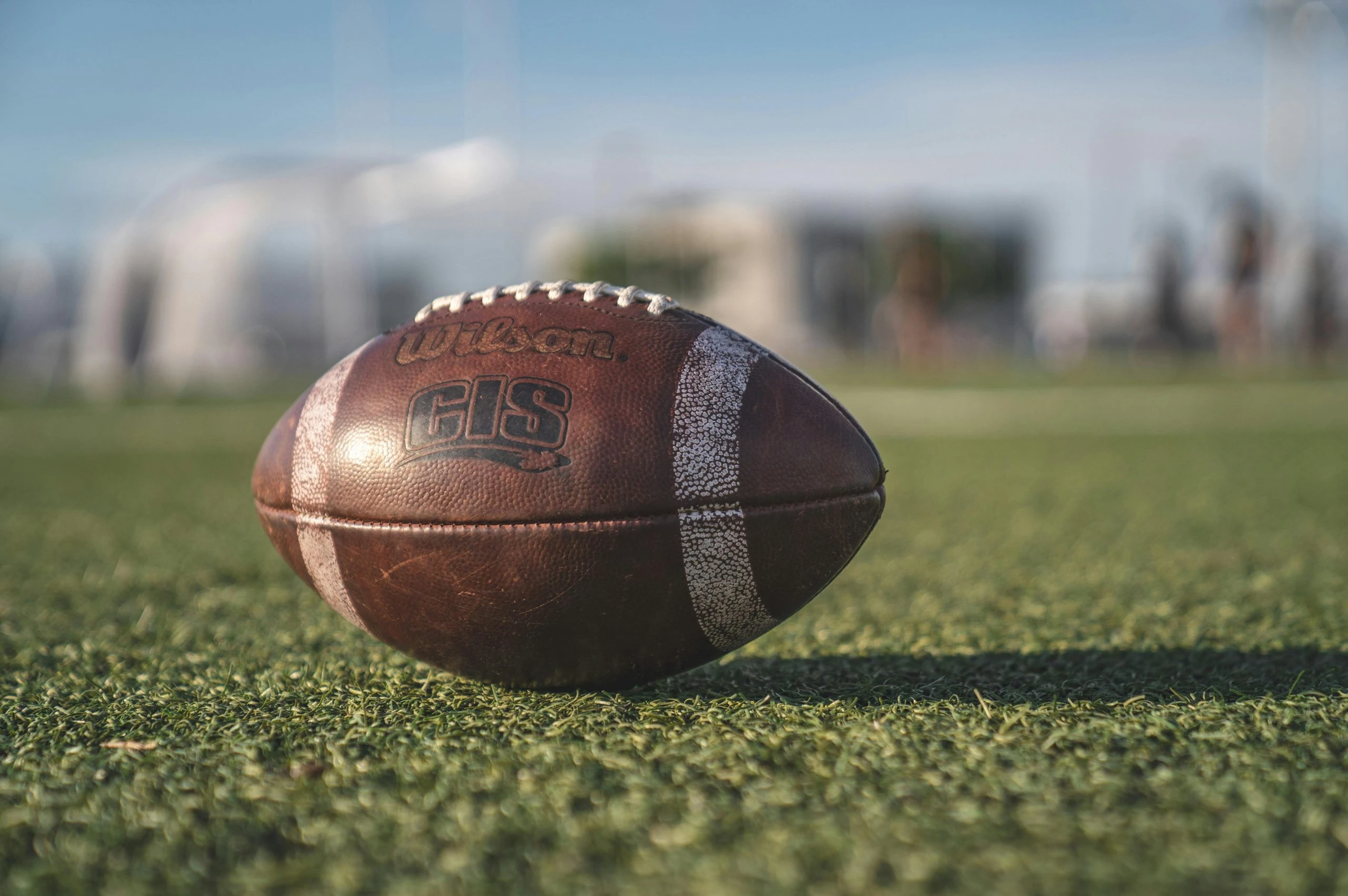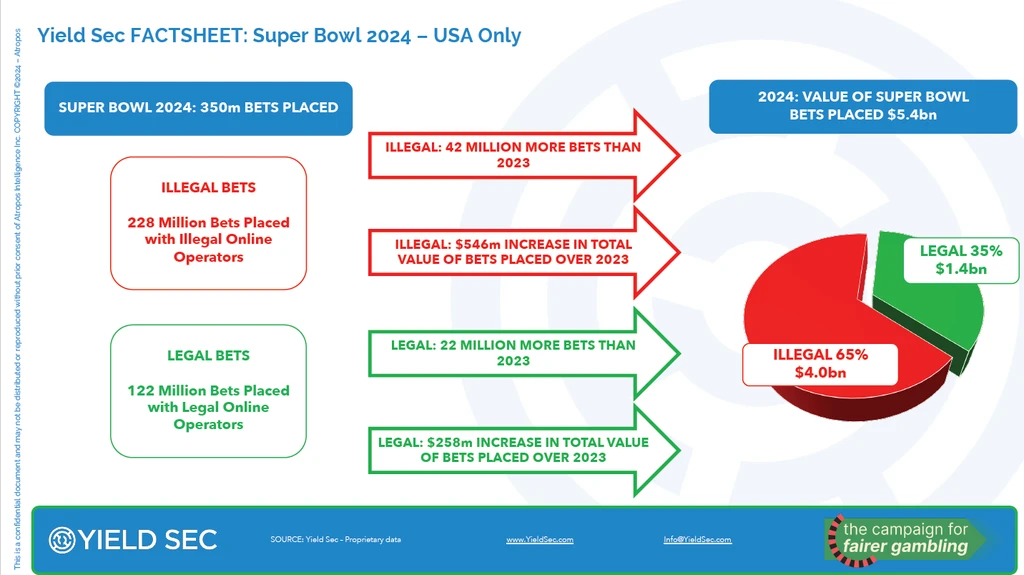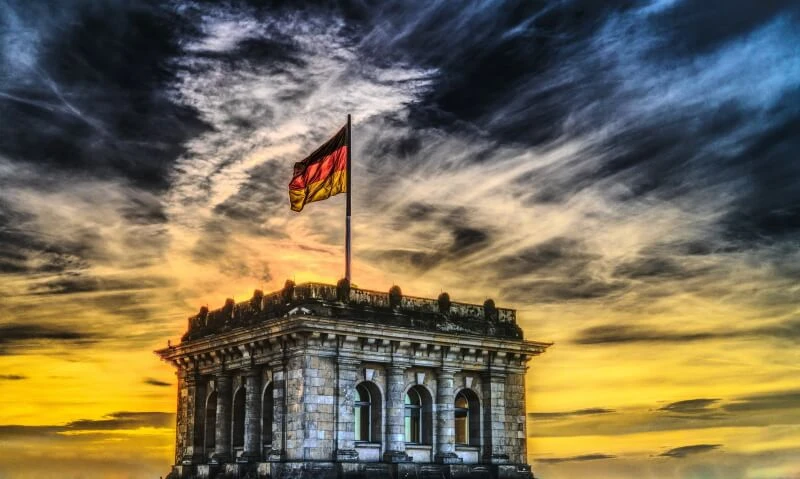Yield Sec: Two-thirds of Super Bowl bets in US were illegal

The research was commissioned by the Campaign for Fairer Gambling (CFG). It analysed how players chose to bet during the 2024 Super Bowl, looking specifically at the performance of the black market. Further research on the gambling share between regulated and unregulated markets is expected in the next few days.
Yield Sec reported that, in total, 350 million bets were placed on this year’s Super Bowl, at a value of $5.4bn (£4.26bn/€4.98bn). The total bets were up by 22.8%, while the betting value shot up 20.0% year-on-year.
In total, 228 million wagers were illegal and 122 million were legal. Illegal bets generated $4.0bn while legal bets made up the remaining $1.4bn. In comparison, the 2023 Super Bowl brought in 286 million bets, split between 186 million illegal bets and 100 million legal bets. Of the $4.5m generated last year, $1.1bn came from legal bets and $3.4bn from illegal wagers.

Yield Sec calculated that the illegal betting market makes up 65% of the Super Bowl’s betting market, with the legal market taking up 35% share.
“Substitution from illegals to legals is simply not happening at the pace it should – illegals are used as brands of choice and convenience, with some substitution to legals for offers and account opening incentives, when available, as with the Super Bowl,” states the report.
Significant growth in black market year-on-year
Yield Sec noted that the illegal Super Bowl betting market had grown yearly, with 42 million more illegal Super Bowl bets recorded from this year’s game. A total of $546m more was also wagered using the black market this year.
While growth was smaller, the legal market also saw improvements, with 22 million more bets recorded year-on-year. There was also a $258m growth in legal betting value.
As to why the illegal betting market continued to hold precedence at this year’s Super Bowl, the report noted that illegal operators took advantage of “sports and allied entertainment” bets. These included bets centred on Taylor Swift – for example, how many times she would appear on camera – which those operators would use to override a legal operator’s offerings.

“Illegals are, quite simply, everywhere that the Super Bowl conversation is taking place online and very close by with transactional opportunities for all Americans,” read the report.
Yield Sec also highlighted that audiences are likely drawn to illegal operators due to the wider range of bet choices and bonuses.
Black market continues to hold control
Ismail Vali, CEO and founder of Yield Sec, said that the illegal betting market clearly still has power over regulated play,
“It’s troubling to see the proximity of illegal gambling to our audiences and the core of the Super Bowl’s conversation and commerce,” said Vali. “With illegal brands capturing nearly two-thirds of all bets on the game, the challenge of shifting control from illegal to legal operators in the online betting and gaming marketplace is more apparent than ever.”
He added that Super Bowl LVIII emphasised the need for regulated play, as illegal betting “threatens the integrity of sports and the gambling industry” and “hampers the potential for increased revenues, tax contributions and consumer protection”.
“The data post-Super Bowl 2024 underscores the critical need for a united effort to regulate, police and enforce the online gambling marketplace,” Vali continued.
As part of iGB’s Super Bowl analysis, Regulus Partners noted that illegal bookmakers now make up just 19% of traditional betting engagement. However, it added that legal bookmakers are channelling only 45% of Super Bowl betting traffic.
CFG makes its play for federal control
Derek Webb, founder and funder of CFG, used YieldSec’s figures to advocate for federal oversight.
“The legal gambling sector sold lawmakers across America the mirage of the regulated market supplanting the black market,” said Webb. “The legal gambling sector, which should be disappointed, has thus far been allergic to any and all federal involvement.”
Webb seemingly claims that legal brands have failed to supersede the black market. However, many states still don’t have a legal gambling market.
“We hope America’s legal gambling sector and its trade groups will reconsider and join us in calling for a federal crackdown on illegal gambling.”
Beyond illegal gambling harming their market, the legal gambling industry has actively campaigned for decisive action to stamp out the offshore threat. Among these is Bill Miller, CEO of the American Gaming Association (AGA). Commenting on the AGA’s third-quarter results, for 2023, Miller said that “record numbers” of Americans were moving to legal and regulated sportsbooks.
“This sustained demand only reinforces the need for federal and state enforcement against illegal, offshore operators,” Miller continued.
A report from the AGA released in 2022 estimated that the US illegal gambling market may be worth $44.2bn per year.
Industry response
The bigger issue and the question that must be asked, is whether federal regulation will serve to solve this problem.
As has been seen, and prevalently highlighted in Germany, excessive regulation on a federal level only serves to drive further traffic to unregulated operators.
Many in the industry take a similar view.
“You already have a Federal Government outside of the guardrails established under the Constitution and now we have someone from across the pond once again telling us how we should to run our government,” said B Global Advisors managing partner Brendan Bussmann in response.
“This isn’t the Beatles. It’s time to reject another uninformed British Invasion.”

